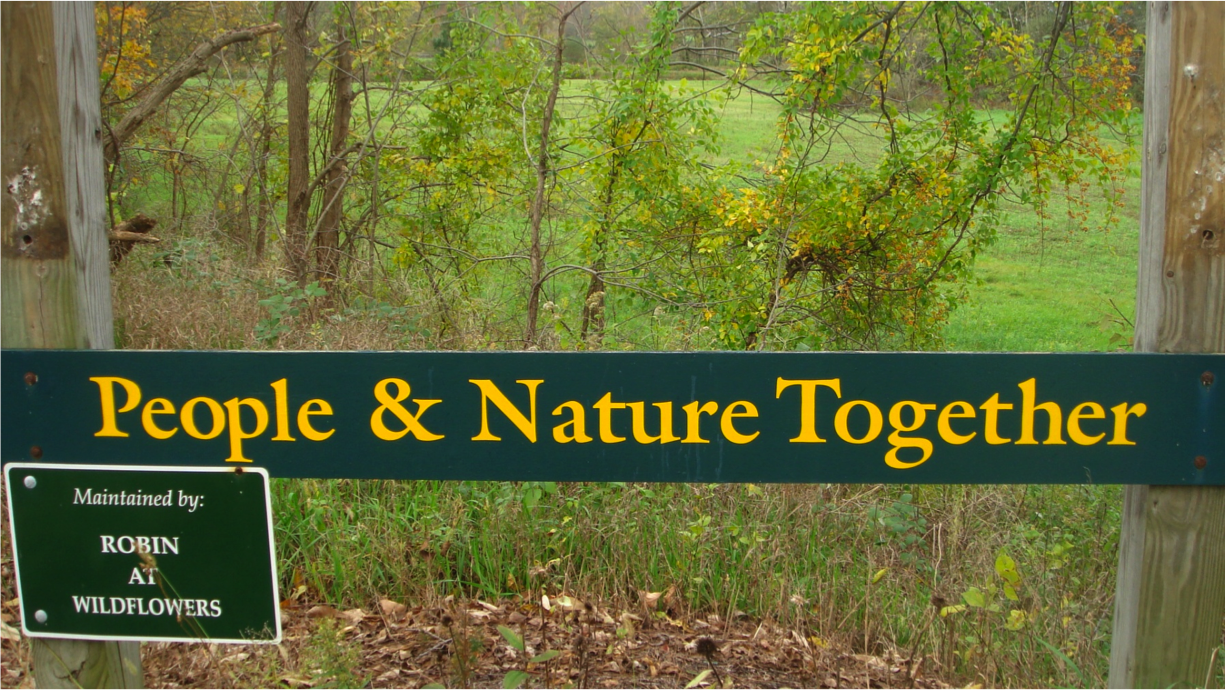 That we have come to think of ourselves as separate from nature shines through when we say "let me take a walk in nature," or when we refer to nature as "outside." And of course it shines through in how we treat nature - we have not been kind to it lately. As a society we have come to view ourselves as superior to nature, as separate from nature; we dominate and control nature, and "use" it for our enrichment. I believe this behavior arose from disassociation and fear - what indigenous person would fear nature? How absurd, they live with it, in it, as part of it, from it. We Westerners of industrialized nations need to relearn to live with it, understand it, be kind to it, embrace it, and work with it.
What is "nature" actually? The 1970s gave rise to the idea of the Gaia principle, the idea of earth as one enormously complex organism that encompasses everything from rocks and rivers, to plants and minerals, animals and humans. While the Gaia principle excludes elements outside of planet earth (the planets, the cosmos) it is a step in the right direction of a more encompassing understanding of our embeddedness in earth. Native American Chief Seattle supposedly said something like "whatever you do to the web you do to yourself." We are part of nature, we are nature just as much as trees, mushrooms, mice, wales, clouds, the sun, or our consciousness. And because We Are Nature we need to relearn to honor it, and we need to learn responsible stewardship of it and ourselves as part of this enormous and intricate web.
That we have come to think of ourselves as separate from nature shines through when we say "let me take a walk in nature," or when we refer to nature as "outside." And of course it shines through in how we treat nature - we have not been kind to it lately. As a society we have come to view ourselves as superior to nature, as separate from nature; we dominate and control nature, and "use" it for our enrichment. I believe this behavior arose from disassociation and fear - what indigenous person would fear nature? How absurd, they live with it, in it, as part of it, from it. We Westerners of industrialized nations need to relearn to live with it, understand it, be kind to it, embrace it, and work with it.
What is "nature" actually? The 1970s gave rise to the idea of the Gaia principle, the idea of earth as one enormously complex organism that encompasses everything from rocks and rivers, to plants and minerals, animals and humans. While the Gaia principle excludes elements outside of planet earth (the planets, the cosmos) it is a step in the right direction of a more encompassing understanding of our embeddedness in earth. Native American Chief Seattle supposedly said something like "whatever you do to the web you do to yourself." We are part of nature, we are nature just as much as trees, mushrooms, mice, wales, clouds, the sun, or our consciousness. And because We Are Nature we need to relearn to honor it, and we need to learn responsible stewardship of it and ourselves as part of this enormous and intricate web.
amazing intent
Intent is the creative energy we use to put thoughts or ideas into action. The stronger the intent the quicker we can make the idea happen (wavering slows the process down or even brings it to a halt). One could say that intent solidifies thought.
 We are currently building a house. For the longest time this house only existed as an idea. But as we kept working at this idea we put processes in place to solidify it and make it appear in the physical realm. We bought property, we imagined how we'd like to live, we sketched floor plans on paper, we thought about what we'd like the house to look like, we hired an architect, then a contractor, we got financing, and now this house we imagined for so long is actually emerging from the ground. Our ideas are becoming reality.
We are currently building a house. For the longest time this house only existed as an idea. But as we kept working at this idea we put processes in place to solidify it and make it appear in the physical realm. We bought property, we imagined how we'd like to live, we sketched floor plans on paper, we thought about what we'd like the house to look like, we hired an architect, then a contractor, we got financing, and now this house we imagined for so long is actually emerging from the ground. Our ideas are becoming reality. ![photo[1]](http://static1.squarespace.com/static/562fa5e4e4b022e56e7591d7/563119b1e4b060e41e5b6970/563119bee4b060e41e5b6c58/1446058430241/photo1.jpg?format=original)
Thought creates matter is what they say. In a way it's quite magical. If you can think something up you can create it. Imagine the possibilities!!!
and now about aromatherapy
 Here is another gentle holistic therapy that acts on the entire body/mind/spirit continuum without side effects (unlike allopathic medications, which alter the body chemistry to counter-act symptoms and do so with side effects). Aromatherapy, in contrast to homeopathy, which I wrote about recently, is a very ancient healing modality dating back thousands of years.
Here is another gentle holistic therapy that acts on the entire body/mind/spirit continuum without side effects (unlike allopathic medications, which alter the body chemistry to counter-act symptoms and do so with side effects). Aromatherapy, in contrast to homeopathy, which I wrote about recently, is a very ancient healing modality dating back thousands of years.
Essential oils are distilled from different plant parts and are massaged into different body parts, inhaled or even ingested. Many essential oils have anti-viral, anti-fungal, anti-bacterial and anti-parasitic properties, and may be excellent substitutes for antibiotics and other drugs with side effects.
I put a few drops of tea tree and eucalyptus oil in a bowl of hot water and inhale the steam for treatment of viral or bacterial infections of the respiratory tract. Lavender oil (diluted in water and sprayed on) heals scar tissue and burns. When my children had ear infections, I dripped a bit of warm (not hot!) olive oil with a drop of tea tree oil (or garlic, oregano or cinnamon oil) into the affected ear, put some cotton in it, and repeated this a few times a day. The ear infection usually cleared without the use of antibiotics. My daughter swears by a drop or two of lavender on her pillow to sleep well. Instead of commercial mouthwash I rinse with a few drops of peppermint and tea tree oil in water after brushing my teeth (tea tree is anti-bacterial, peppermint is anti-inflammatory). When my children had colds I used to put a diffuser in their room overnight with a few drops of eucalyptus and tea tree oil.
The sicker our body and our emotional health, the lower the frequency of the body. Different essential oils have different electrical frequencies. A properly trained aromatherapist can realign the body's "out-of-tune" frequency through a combination of different oils and different application methods on different body locations. This is obviously much more complex than my little home remedies.
Please take a look at these links for further inspiration and information: University of Maryland Medical Center on aromatherapy, www.aromatherapy.com, and health.howstuffworks.com.
On a different note, essential oils, such as citrus oils (lemon, orange) or herbal oils (rosemary, thyme) can be used in cooking and baking (cinnamon oil) by adding a few drops to cake or cookie dough or salad dressings for example.
Happy healing and happy cooking!
what about homeopathy?
As we are reaching the limits of absurdity of our Western healthcare system, as in outrageous costs (see NY Times on the outrageous cost of medical procedures here vs. other countries), ineffective treatments, reimbursement nightmares, being treated like a number, dangerous side effects, to name just a few issues, more and more people are turning to what they call "CAM," complementary and alternative medicine. Over the next few weeks I will present a few of those alternative therapies as a matter of inspiration. I can't hide my bias for homeopathy, coming from Germany (where it comes from), and having grown up in France and Belgium (where pharmacies' awnings declare whether they carry homeopathic remedies, which many of them do, because it is a commonly accepted treatment method over there).
Over on this side of the Atlantic homeopathy is oftentimes still poopooed as "nothing more than diluted water" out of sheer ignorance - but then there will always be skeptics until they open up their minds to new possibilities.
Homeopathy, like for example aromatherapy, works on the subtle energetic level. The remedies realign and rebalance our frequencies (the higher your frequency the healthier and more joyful you are, the lower your frequency the worse your health and also your disposition and emotional wellbeing). Homeopathic remedies come in dilutions so minute, that the original substance cannot be detected in them. However, the pill or the water the pill has been dissolved in, has been imprinted with the subtle information of the original matter it was made of such as mineral or plant. Strangely enough, the higher the potency, the more subtle the dilution - and lo and behold, the more powerful the effect.
Over-the-counter remedies, like the blue ones shown in the first picture, can be helpful. They come in the lower potencies. But the real help comes by seeing a homeopathic practitioner, preferably someone who is also an MD, and who determines the appropriate remedy via conversation to understand your symptoms, character, disposition, moods etc. S/he may prescribe some of the higher potencies shown in the second picture, that should only be taken with appropriate instruction from a qualified practitioner as to how often to take them.
Homeopathy is powerful, yet very gentle, and has no side effects whatsoever. It is as effective for many physical symptoms as it is for emotional ones, such as depression, anxiety or eating disorders. How the healing proceeds depends on many factors. Oftentimes, I have taken a homeopathic remedy and after a few weeks the symptom has simply subtly disappeared. Other times, the effect can be almost immediate. It does happen, too, that other issues or symptoms disappear as well, or that you feel better in ways you would never have been able to anticipate.
Once, while I was still doing Taekwondo, I began taking a remedy. A few days later I had to do a wood break. My subtle energy had risen to such a level that the wood broke a split second before my heel actually hit the wood!
Please check out the American Institute of Homeopathy, The North American Society of Homeopaths and the National Center for Homeopathy for more information. Happy Healing!
put your money where your values are
In the spring we switched our electric energy supplier to Viridian and chose 100% renewable energy (they also have a 20% renewable energy option). Viridian is a socially responsible (another worthwhile value) power company that supplies clean energy from local wind power. I found that cheaper is not necessarily better, because this is no longer my only value and consideration when making a purchase. Oh - I do admit that I buy things at Walmart - where else can I get sewing thread, school notebooks, cotton socks, a sink stopper, pens and envelopes, marshmallows for our camping trip all in one place? And at Trader Joe's (lots of inexpensive organics). But then they have certain values attached to them, which I buy into. Walmart (the new Woolworth) offers lots of different utilitarian things in one place (important since I live in the country and have few specialty stores), and Trader Joe's means organics for the masses.
I am conscientious about what I buy and where I buy it: meat from local farmers (or venison from our own fall harvest), produce from food coop, local farm stands, or the farmers' market, organic grocery staples in bulk from the coop, eggs from a friend or a local farmer, clothes for myself and my daughter mostly from local second hand stores, pet supplies from the local pet store for the corn based cat litter (and I make my own cat food), 100% recycled copy paper for the office: from Staples (only place that has it), 100% recycled toilet paper and paper towels from Trader Joe's (lots less than the local supermarket), to name just a few choices that indicate clear values.
Imagine what would happen if 80% of Americans stopped buying GMO corn and soy products? And remember, if you don't buy organic they'll keep spraying the pesticides that are killing the bees, which are our main produce pollinators (!!!). So be aware of what values you fund, or don't fund with your purchases. Cheap is not the only value.
Also see a similar post on voting with your dollars.
healing is shifting
"Doctors don't dispense wellness, they suppress symptoms," Dr. George Wootan, a pretty enlightened family practitioner from West Shokan, NY, said recently during a talk I attended. There you have my gripe with allopathy, the Western medical healing paradigm. Suppressing symptoms is not healing because it maintains the same underlying thought patterns. A friend recently posted something like this on Facebook: "Has it ever happened to you that all of a sudden you see something in a totally different light, and you wonder how it happened, and why you did not see it in that light all along?" A shift has happened.
Some of these shifts happen gradually over the years, some of them happen suddenly. Eckhart Tolle describes such a sudden shift early in his first book The Power of Now. After years of dread and depression he woke up one morning and suddenly the world looked bright and beautiful to him.
True healing comes from within. It arises out of shifts in thinking, in consciousness. I believe that almost all ailments are due to emotional hang-ups - such as negative thoughts and beliefs, emotional trauma, or past life residues. When you clear these, through your own work and intent, or with someone's help, the energy channels open up and the shift happens, all by itself.
making cat cupcakes
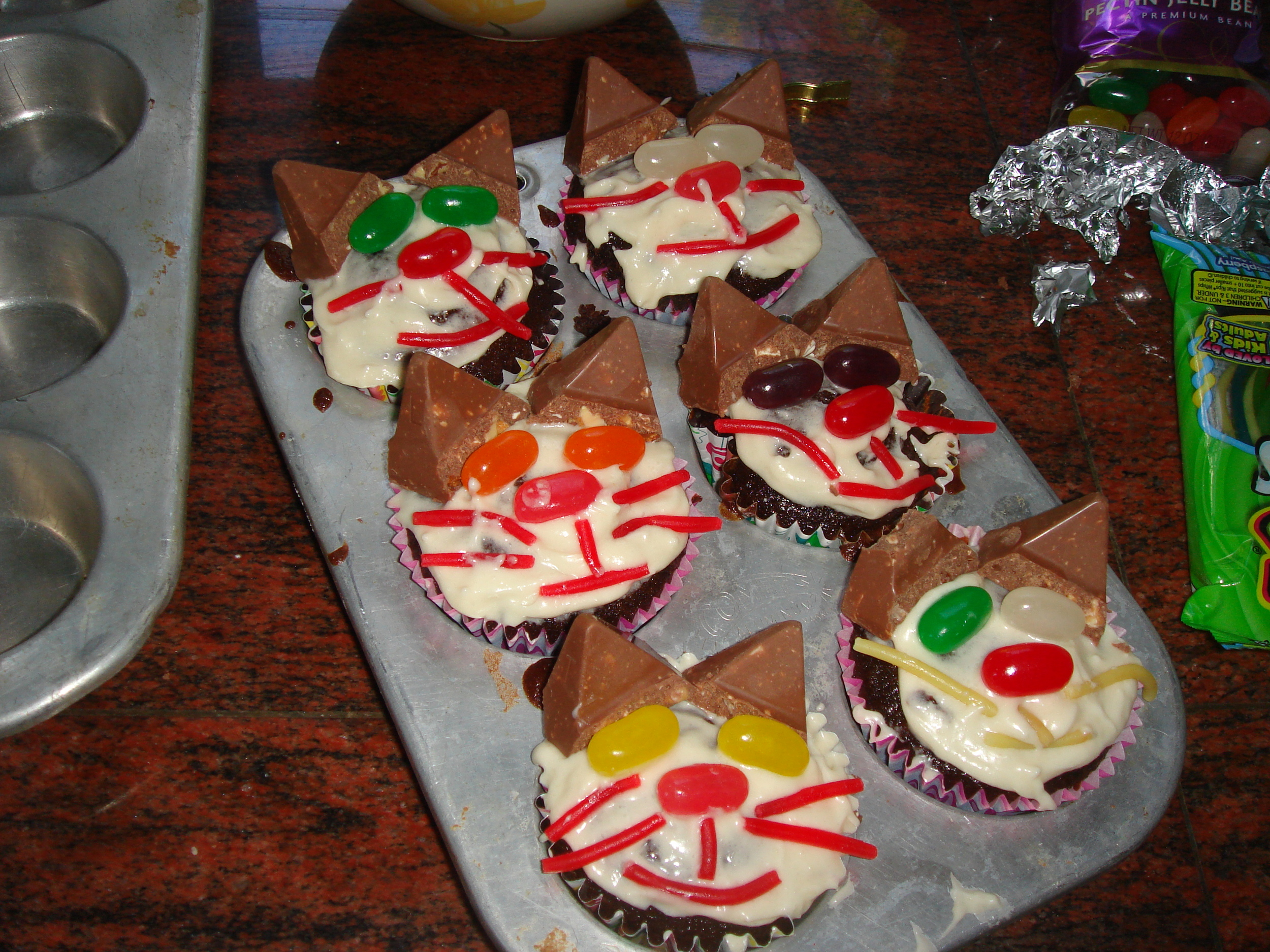 I am the first culprit when it comes to what I am going to say now, although I have worked my whole life towards what Confucius supposedly said: "Choose a job you love, and you will never have to work a day in your life."
In general we need to play more in order to enjoy more. We are rusty at playing - at least I am. Much of life seems to be a chore. So when my daughter made cat cupcakes a few days ago - because she loves cats, and she loves to bake - it reminded me of how little I play. I am just not silly enough (my excuse is that seriousness is in my astrological profile, something about Saturn I think - but then the scientists have already proven that DNA is not static and that we can change our nature and our biology).
I am the first culprit when it comes to what I am going to say now, although I have worked my whole life towards what Confucius supposedly said: "Choose a job you love, and you will never have to work a day in your life."
In general we need to play more in order to enjoy more. We are rusty at playing - at least I am. Much of life seems to be a chore. So when my daughter made cat cupcakes a few days ago - because she loves cats, and she loves to bake - it reminded me of how little I play. I am just not silly enough (my excuse is that seriousness is in my astrological profile, something about Saturn I think - but then the scientists have already proven that DNA is not static and that we can change our nature and our biology).
Martha Beck says in her Finding Your Way In A Wild New World: "...the way to cope with the increasing complexity of the wild new world is to play more." When we are happily doing and forget about the thinking - whether we dance, sing, make art, make music, play with our children, write a poem, make cat cupcakes - that's play. Now all we need to do is figure out how to make doing the laundry, or driving the kids all over town, or commuting, or any number of chore-like activities a playful thing. Any thoughts?
be patient!
We have become used to instant gratification. Information is now available at the touch of a finger. We no longer write letters, barely even send e-mails or make telephone calls, we text and twitter. Our attention spans have become shorter, as teachers have noticed, and the movie and TV industries exploit and promote it, which then self-perpetuates.  On the material side the credit system has enabled us to buy now and pay later, since we choose no longer to be patient until we have saved up enough money. Besides houses and cars we can also get everything else instantly without paying for it upfront (just pay Amazon an annual fee and you'll get 2-day shipping on all your orders). We have lost our patience, we live on credit, and we are banking on a better future to acquire today’s perceived needs now.
On the material side the credit system has enabled us to buy now and pay later, since we choose no longer to be patient until we have saved up enough money. Besides houses and cars we can also get everything else instantly without paying for it upfront (just pay Amazon an annual fee and you'll get 2-day shipping on all your orders). We have lost our patience, we live on credit, and we are banking on a better future to acquire today’s perceived needs now.
The belief that this system will work long-term is also coloring our relationship with nature. Many don’t want to believe - yet, as it seems - that oil and natural gas reserves are finite. Many don’t want to believe - yet, - that we have a huge garbage problem. Many don’t want to believe that we have any number of grave environmental challenges to deal with. We’ll fix them in the future – or so many still like to believe. Environmentally speaking, we live thus on credit instead of investing now into our environmental future. From indigenous cultures we need to relearn patience and a long-term outlook on issues. 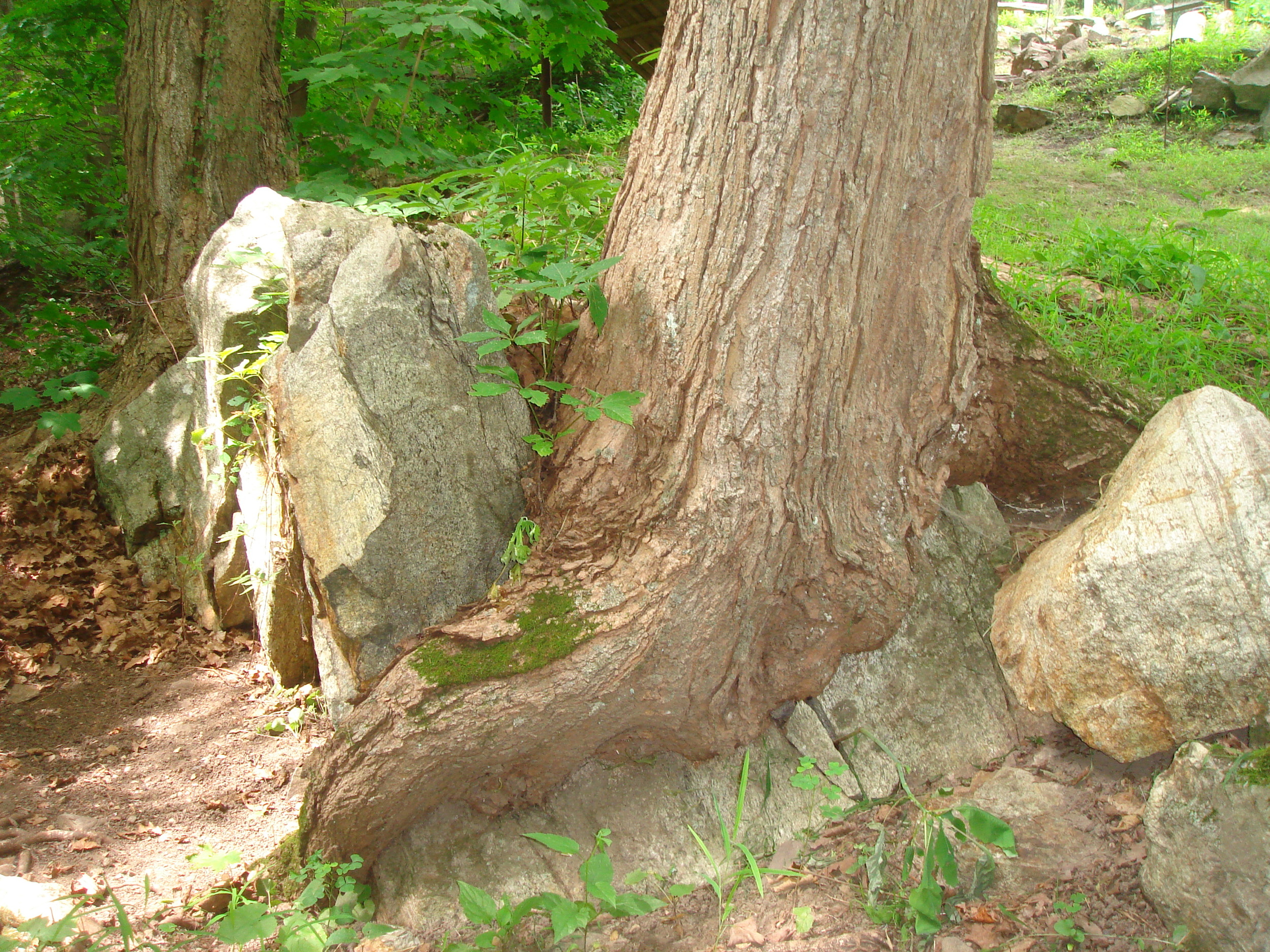
Native Americans look seven generations ahead into the future! We must invest in a viable future for our children, grandchildren, and five more generations out, instead of leaving them to mop up our messes. The Lorax is a good book by Dr. Seuss on what happens otherwise.
why men need women
Women are more generous than men, Adam Grant noted in his NYT article of the same title yesterday. Yesterday, too, a friend raved about her daughter's female boss, who provides her with benefits and vacation time even though the daughter works only part-time. I am not saying that women make better bosses. But we are naturally more nurturing and empathetic, while men are more driven and result oriented, the yin and yang of Chinese philosophy. Yet, we shouldn't want to do away with the guys in business. Balance is everything, and we need both energies - the driving and the nurturing one. The article reports that women inspire the men in their lives to greater philanthropy and generosity - i.e. Melinda Gates is the driving force behind the Bill & Melinda Gates philanthropic foundation according to Grant).
I believe that the incoming cultural paradigm is or will be more balanced, more heart based, more sustainable, because we are beginning to realize that strict bottom line capitalistic exploitative yang behavior is dangerous to our health (environmental damage etc) because it is unbalanced. We need both energies, since they complement each other perfectly.
Women are slowly leading men away from ying domination to greater balance. The rise of women's empowerment, their greater involvement in business and politics, and their slow and steady recognition as equals attest to that. Adam Grant concludes his article with the (wise) recommendation that men follow our lead.
why fair trade?
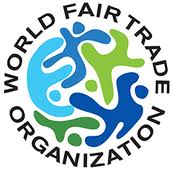 Have you read about the awful recent garment factory collapse stories in Bangladesh? Do you know what fair trade coffee or what a fair trade banana is?
Well, here it is. According to Elizabeth Henderson, an organic farmer for 30 years who helped organize the Domestic Fair Trade Association, "a fair price is the right price with a triple bottom line people-profit-earth."
Have you read about the awful recent garment factory collapse stories in Bangladesh? Do you know what fair trade coffee or what a fair trade banana is?
Well, here it is. According to Elizabeth Henderson, an organic farmer for 30 years who helped organize the Domestic Fair Trade Association, "a fair price is the right price with a triple bottom line people-profit-earth."
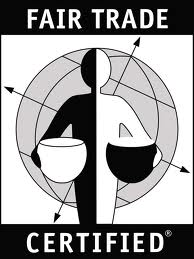 Fair Trade began with such crops as bananas, coffee and cocoa from South America because the local farmers were being exploited in the interest of a low sale price and the biggest possible profit for Dole or Chiquita or Chock-Full-O'Nuts or whoever else. The idea of Fair Trade is a facet of the "new economics," the newly arising cultural paradigm of watching out for all of us, not just some of us - the health of the farm worker, a fair wage for the farm worker, a sustainable agriculture that does not harm the earth, a healthy product for the consumer, and a fair profit for the banana exporter/importer or cocoa powder maker. See WFTO and Fair Trade USA for more information.
Fair Trade began with such crops as bananas, coffee and cocoa from South America because the local farmers were being exploited in the interest of a low sale price and the biggest possible profit for Dole or Chiquita or Chock-Full-O'Nuts or whoever else. The idea of Fair Trade is a facet of the "new economics," the newly arising cultural paradigm of watching out for all of us, not just some of us - the health of the farm worker, a fair wage for the farm worker, a sustainable agriculture that does not harm the earth, a healthy product for the consumer, and a fair profit for the banana exporter/importer or cocoa powder maker. See WFTO and Fair Trade USA for more information.
Fair Trade is a win-win situation, all parties involved profit from it; non fair trade is win-lose, because only one side wins. Of course this means that the end product costs a bit more. But what's wrong with that if in the end we all profit from it?
The DFTA (Domestic Fair Trade Association) now promotes the same principles of health, justice and sustainability on a domestic level. And, to complete my loop to the recent garment factory disasters, through all our awakening to these issues the beautiful win-win principles of Fair Trade will surely make a leap to the garment factories abroad so those workers can work in safe buildings and work for fair wages.




